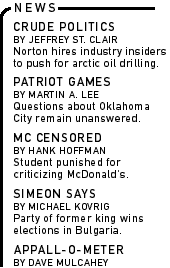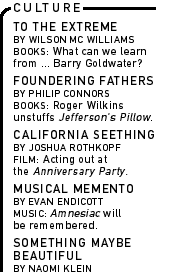

|

|

|

|
|
|
| |
|
|
|
Before the Storm: Barry Goldwater and the
Barry Goldwater's nomination wasn't supposed to happen. As Rick Perlstein reminds his readers, in the early '60s, the "end of ideology" was orthodoxy in social science. Eisenhower and Nixon were identified with an internationalist, corporate "modern Republicanism" that conceded government's role in promoting economic prosperity and public welfare. Serious political argument seemed confined to the margins, a matter of increments rather than principles. It was, John Kenneth Galbraith was moved to write, a time when "the bland led the bland." Yet at the Republican convention in 1964, there was Goldwater, intoning lines adapted (by Harry Jaffa, a distinguished conservative student of political philosophy) from Cicero: "Extremism in defense of liberty is no vice ... moderation in the pursuit of justice is no virtue." In part, Goldwater was lucky. His rivals either self-destructed like Nelson Rockefeller
Goldwater's nomination was the first great triumph of the new American conservatism, a complex coalition of right-wing moralists and libertarians, agreed in militant anti-communism abroad and opposition to "socialism" at home, united by their enemies and by resentment. As Perlstein's fine account indicates, the movement involved more than finding "ideological soul mates": It entailed a "learning how to act," the arts of association and advocacy and a disciplined focus on the main objective willing to mute or minimize internecine quarrels. The right had its money men and its elites, its intellectuals, like Bill Buckley, and its operatives, like Clif White, but its strength lay at the grassroots, an "army of true believers" created by "organizing manuals." Perlstein, an In These Times contributor named last year by The Village Voice as a "writer on the verge," knows how to tell a story. He treats conservatives fairly and even with some sympathy, and while he doesn't neglect the rich strain of nuttiness on the right in 1964--not just the Birchers, but also people like the Goldwater delegates at the San Francisco convention who referred to Rockefeller as an "international socialist"--he resists the temptation to caricature. And he captures a good deal of the insider's experience of a campaign, the increasingly breathless pace; the inner animosities, personal and factional, heightened by the sense of great political stakes; exhaustion linked to exalted highs and desperate lows; and the tendency to feel a potential tornado in any shift in the political wind. Perlstein recalls the things that gave the Goldwaterites hope--the Bobby Baker and Walter Jenkins scandals, the racial "backlash" accentuated by summer riots, the sense of moral unease--but he never forgets that, from the beginning, Goldwater was destined to rally the troops and go down to overwhelming defeat. The conservative movement, after all, survived that electoral catastrophe. Perlstein argues--as Buckley did, amid the closing tumult of the 1964 campaign--that it was less important that Goldwater was fated to lose than that conservatism had proved capable of articulating an alternative on the right, reshaping American political dialogue for the decades that followed. That perceived result helps explain why Perlstein, a journalist on the left, should be interested in the doings of right-wingers that took place five years before he was born. His subtext is the hope that the left can learn from the right's successful failure--that the left can learn "how to act" in a way calculated to challenge the consensus of our times, the ideology of the market and the retreat from the regulatory state. If the Goldwaterites averted the "end of ideology," Perlstein looks for a left that can avoid the "end of history." There are, however, at least two problems with this line of argument. In the first place, it risks giving the right too much credit: At least as much of the "unmaking of the American consensus" was due to the left. The civil rights movement--especially given LBJ's warm embrace--by making race a central theme of national politics, shattered old coalitions and understandings, giving the right a crucial opportunity. Racial resentment was the apple in the garden for Republican conservatives: Both Goldwater and Nixon, with moderate records on civil rights, could not resist the temptation to maneuver for George Wallace's support. For that matter, while LBJ talked consensus and conciliation, his Great Society involved a radical extension of the federal government's role, more a response to Michael Harrington's The Other America than a reflection of late '50s liberalism. And of course, Vietnam--not much more than a shadow to the election of 1964--proved to inflict a nearly mortal wound on the Democratic coalition. In fact, although Ronald Reagan's ascent within the GOP began with the Goldwater campaign, his victory in 1980 is inconceivable without the McGovernite capture of the Democratic Party in 1972, the left's counterpart to the Goldwater nomination in 1964. The McGovern nomination, among other things, moved social "wedge" issues into the forefront of the Democratic agenda, playing a decisive role in creating the "Reagan Democrats" who still haunt American politics. The postwar politics of consensus, such as it was, was pulled apart from both sides of the ideological spectrum, and militancy on the left contrived to make conservatives seem less extreme. Similarly, today's mistrust of government--partly the legacy of events like Vietnam, Watergate and our disappointments with the Great Society, partly a reflection of the libertarian drift of our culture--is almost as strong on the left as it is on the right. And for any revival on the left, a vision of democratic authority is at least as important as--and not really separable from--instruction in the arts of politics. In any case, politics in 1964 offers only very limited lessons for contemporary practice. As Perlstein indicates, there was already something anachronistic about the Goldwater movement: Focused on assembling a disciplined majority of convention delegates, Clif White--Goldwater's best strategist--seemed virtually unaware of "what a blitzkrieg looked like broadcast live on TV." The Goldwater zealots looked and sounded altogether too much like a lynch mob, so that " 'pyrrhic' was hardly an adequate word" to describe their victory. It wouldn't happen today: Conventions now are scripted and staged, if anything too boring to be worth TV's time. But then, Barry Goldwater wouldn't be nominated today. In primaries, Goldwater was anything but impressive: He even lost New Hampshire to a write-in candidate, Henry Cabot Lodge, who--serving as ambassador to South Vietnam--never campaigned at all. White's master plan aimed at winning delegates largely chosen in conventions and caucuses, where disciplined organization can be decisive. In 1964, that was enough, although even then, Goldwater might not have been the nominee without his narrow victory over Rockefeller in the California primary. Nowadays, that would be out of the question. The changes initiated by the Democrats in 1968 and 1972 have created a nominating process overwhelmingly dominated by primaries and hence by mass electorates, media and money. It is harder and harder to challenge elites: Both of the last two Republican nominations, some early turbulence aside, were essentially coronations. In one sense, Perlstein is obviously right to suggest that the years have made fools of the pundits and political scientists who argued, post-Goldwater, that another conservative nominee would be ruinous for the Republicans. But conservatism--in style and substance--has had to stoop to conquer. Barry Goldwater drew battle-lines: He proposed selling the TVA and making Social Security voluntary; he expressed opposition to the progressive income tax; and--as if to emphasize Johnson's relative moderation--he talked about "defoliating" Vietnam with low yield nuclear weapons. Subsequent conservatives--with Reagan the amiable master spirit--have conciliated where Goldwater confronted, blurring the edges of ideology with fuzzy math (as Perlstein notes, Reagan, unlike Goldwater, made excellent, if misleading, use of statistics) and fuzzier reasoning, promising a "safety net" or "compassionate conservatism." Nor is this simply a matter of rhetoric. Today's conservatives do not criticize the Civil Rights Act or Medicare; they accept, at least in public, a good deal of the Great Society. Prevailing opinion, after all, admires bipartisan good feeling. Americans are just as disposed toward tolerance as Alan Wolfe has suggested, not inclined to harm others but not greatly moved to help them either, feeling more or less comfortable but vulnerable, with few hopes beyond being left alone. It is, however, an uneasy consensus, lacking the moral basis afforded, back in the '50s, by the Cold War. Not that it will be easy to realize the possibility of a new progressive
politics: The political world is more demoralized and oligarchic
than the one faced by Americans, left and right, at the time of
Perlstein's story. Perlstein reminds us that, for all its difficulty,
organization can still link voice to power and that committed citizenship--even
of a crack-brained sort--can still aspire to a measure of self-rule.
Wilson Carey McWilliams teaches political science at Rutgers University. He is the author of Beyond the Politics of Disappointment? American Elections, 1980-1998.
|


